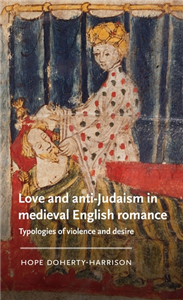Love and anti-Judaism in medieval English romance
Typologies of violence and desire
by Hope Doherty-Harrison
Description
More Information
Rights Information
Albania, Algeria, Angola, Argentina, Armenia, Australia, Austria, Bahrain, Belgium, Belize, Benin, Bolivia, Bosnia and Herzegovina, Botswana, Brazil, Bulgaria, Burkina Faso, Burundi, Cameroon, Canada, Cape Verde, Central African Republic, Chad, Chile, China, Colombia, Comoros, Congo [DRC], Congo, Republic of the, Costa Rica, Ivory Coast, Croatia, Czech Republic, Denmark, Djibouti, Ecuador, Egypt, El Salvador, Equatorial Guinea, Eritrea, Estonia, Ethiopia, Faroe Islands, Finland, France, French Guiana, Gabon, Gambia, Georgia, Germany, Ghana, Greece, Guatemala, Guinea, Guinea-Bissau, Guyana, Honduras, Hongkong, Hungary, Iceland, India, Indonesia, Iran, Iraq, Ireland, Israel, Italy, Japan, Jordan, Kazakhstan, Kenya, Kuwait, Latvia, Lebanon, Lesotho, Liberia, Libya, Lithuania, Luxembourg, Macau, China, Macedonia [FYROM], Madagascar, Malawi, Malaysia, Mali, Malta, Mauritania, Mauritius, Mayotte, Mexico, Mongolia, Montenegro, Morocco, Mozambique, Namibia, Netherlands, New Zealand, Nicaragua, Niger, Nigeria, Norway, Oman, Pakistan, Panama, Paraguay, Peru, Philippines, Poland, Portugal, Puerto Rico, Qatar, Reunion, Romania, Russia, Rwanda, Saint Helena, Sao Tome and Principe, Saudi Arabia, Senegal, Serbia, Seychelles, Sierra Leone, Singapore, Slovakia, Slovenia, Somalia, South Africa, South Korea, Spain, Sri Lanka, Sudan, Suriname, Swaziland, Sweden, Switzerland, Syria, Taiwan, Tanzania, Thailand, Timor-Leste, Togo, Tokelau, Tunisia, Turkey, Uganda, Ukraine, United Arab Emirates, United Kingdom, United States, Uruguay, Venezuela, Vietnam, Western Sahara, Yemen, Zambia, Zimbabwe, South Sudan, Cyprus, Palestine, Bangladesh, Cambodia, Liechtenstein, Azerbaijan, Jamaica, Kyrgyzstan, Dominican Republic, Myanmar, Monaco
Endorsements
Love and anti-Judaism is a new examination of medieval romance for the questions it poses of the most significant events in Christian history. Did the life of Christ change the nature of love? How could the sacrifice of Abraham and Isaac, which did not happen, prefigure that of Christ, which did? Can reactions to sexual violence approach the responsibility demanded by sacrifice? Providing new readings of the richly-studied romances Sir Gawain and the Green Knight and Sir Orfeo, the book also investigates Sir Gowther and Sir Amadace for their sophisticated responses to these theological questions. The book argues that romance explores difficulties in the Christian practice of reading the Hebrew Bible as a prefiguration of Christ. Such a mode of biblical reading is foundational to medieval anti-Judaism, with Jewish interpretations accused of being incomplete or incorrect because they did not depend upon Christ. Focusing on the Song of Songs, Love and anti-Judaism demonstrates that medieval exegesis often depended upon the figure of Synagoga, the personification of Jewish faith and community in the Christian imagination, for the construction of Christ as a lover who sacrificed himself for his bride. Such dependence enabled medieval romance to build world-shaking ambivalence into its portrayals of love and sexual violence. An examination of anti-Judaism as a discourse of violence and desire that could be turned inwardly to expose the irresolution in Christianity, this book demonstrates that medieval romance reanimates biblical sacrifice in the vulnerabilities of love.
Reviews
Love and anti-Judaism is a new examination of medieval romance for the questions it poses of the most significant events in Christian history. Did the life of Christ change the nature of love? How could the sacrifice of Abraham and Isaac, which did not happen, prefigure that of Christ, which did? Can reactions to sexual violence approach the responsibility demanded by sacrifice? Providing new readings of the richly-studied romances Sir Gawain and the Green Knight and Sir Orfeo, the book also investigates Sir Gowther and Sir Amadace for their sophisticated responses to these theological questions. The book argues that romance explores difficulties in the Christian practice of reading the Hebrew Bible as a prefiguration of Christ. Such a mode of biblical reading is foundational to medieval anti-Judaism, with Jewish interpretations accused of being incomplete or incorrect because they did not depend upon Christ. Focusing on the Song of Songs, Love and anti-Judaism demonstrates that medieval exegesis often depended upon the figure of Synagoga, the personification of Jewish faith and community in the Christian imagination, for the construction of Christ as a lover who sacrificed himself for his bride. Such dependence enabled medieval romance to build world-shaking ambivalence into its portrayals of love and sexual violence. An examination of anti-Judaism as a discourse of violence and desire that could be turned inwardly to expose the irresolution in Christianity, this book demonstrates that medieval romance reanimates biblical sacrifice in the vulnerabilities of love.
Author Biography
Hope Doherty-Harrison is a Leverhulme Early Career Fellow at the University of Edinburgh
Manchester University Press
Manchester University Press is a leading UK publisher known for excellent research in the humanities and social sciences.
View all titlesBibliographic Information
- Publisher Manchester University Press
- Publication Date September 2025
- Orginal LanguageEnglish
- ISBN/Identifier 9781526183170 / 152618317X
- Publication Country or regionUnited Kingdom
- FormatPrint PDF
- Pages336
- ReadershipGeneral/trade
- Publish StatusPublished
- Dimensions216 X 138 mm
- Biblio NotesDerived from Proprietary 5977
- SeriesManchester Medieval Literature and Culture
- Reference Code17073
Manchester University Press has chosen to review this offer before it proceeds.
You will receive an email update that will bring you back to complete the process.
You can also check the status in the My Offers area

Please wait while the payment is being prepared.
Do not close this window.



